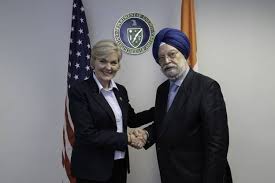Strategic Clean Energy Partnership (SCEP)

- 18 Sep 2024
In News
The recent Strategic Clean Energy Partnership (SCEP) Ministerial between the United States and India aimed to enhance collaboration in clean energy innovation, energy security, and the transition to clean energy.
About the Partnership
The meeting reviewed significant achievements and future initiatives across five core pillars:
- Power and Energy Efficiency
- Responsible Oil and Gas
- Renewable Energy
- Emerging Fuels & Technologies
- Sustainable Growth
The SCEP facilitates bilateral cooperation on clean energy, focusing on power, efficiency, renewable resources, emerging technologies, and sustainable practices.
Key Highlights of SCEP
Renewable Energy Technology Action Platform (RETAP)
Launched in August 2023, RETAP aims to create actionable roadmaps for:
- Hydrogen
- Long-duration energy storage
- Offshore wind
- Geothermal technologies
Energy Storage Task Force
This public-private initiative seeks to address:
- Policy
- Safety
- Regulatory challenges
It explores alternatives to lithium-ion technologies, with projects like Battery Energy Storage Systems (BESS) in Assam and Haryana focusing on grid integration and renewable energy storage.
Modernization of Power Distribution
The meeting underscored India’s advancements in:
- Smart metering
- Power market reforms
- The Indian Railways’ goal of achieving net-zero emissions by 2030
India has successfully procured 1.5 GW of round-the-clock renewable energy.
Sustainable Aviation Fuel (SAF) & Transport Electrification
A comprehensive workshop was launched to enhance R&D, certification, and partnerships for SAF. India’s PM eBus Sewa scheme aims to deploy 10,000 electric buses, promoting electrification in medium and heavy-duty transport.
Carbon Capture, Utilization, and Storage (CCUS) & Methane Abatement
Cooperation on CCUS technologies and regulatory frameworks has increased, alongside efforts to reduce methane emissions in the oil and gas sector through collaboration with India’s Directorate General of Hydrocarbons.
Public-Private Collaborations
The importance of public-private dialogues in shaping policies and reducing the costs of clean energy technologies was emphasized.
Initiatives Supporting Clean Energy
- International Solar Alliance (ISA): A global coalition led by India, promoting solar energy collaboration among solar-rich countries.
- Renewable Energy Technology Action Platform (RETAP): A US-India initiative focusing on hydrogen, energy storage, offshore wind, and geothermal technologies.
- Green Hydrogen Mission (India): Promotes green hydrogen as a clean energy alternative, especially in heavy industries and transportation.
- EU’s Green Deal: A European strategy aimed at achieving climate neutrality by 2050 through clean energy investments and policies.
- PM KUSUM Scheme (India): Supports solar power generation for irrigation, reducing fossil fuel reliance in agriculture.
